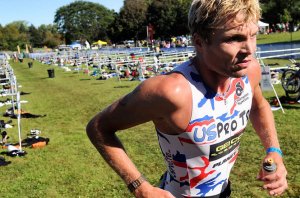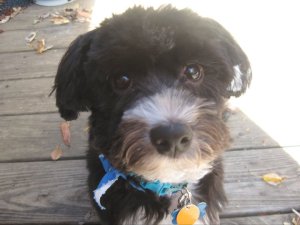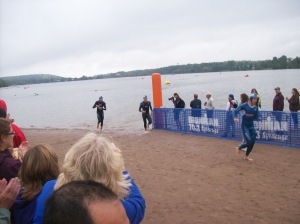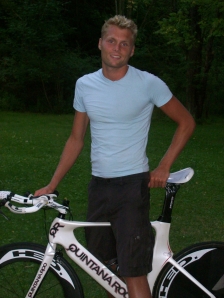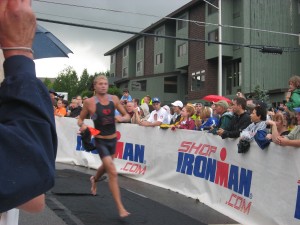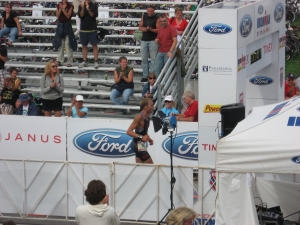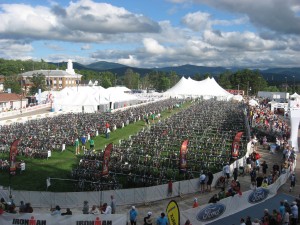Follow Me on Twitter
My greatest bits of wisdom often come in the form of short, unintelligible statements that I later regret making. With that in mind, I’ve opened a Twitter account. Follow me. You’ll laugh. You’ll cry. You’ll throw up in your mouth when you realize how many donuts and EL Fudge cookies I eat.
2011 In Pictures
They say that a picture is worth 1,000 words. That’s good, because I’ve written approximately zero words in the past thirteen months on this blog. Rather than try to cram a year’s worth of exploits into a single post, I thought it’d be better to try to tell the story in pictures:
After my 8th-place finish at Eagleman, USPro Tri team manager Ryan shot some photos of me for the team website. “Just run toward the camera” is harder than it sounds after racing for four hours. I cramped up pretty good after this shot:

Sitting at “Moose” after finishing Ironman Coeur d’Alene (my first top-1o Ironman finish) with my “recovery drink” of choice: “Moose Drool” lager, courtesy of the owner.
Tim Snow and I both had the bright idea of racing Ironman Lake Placid four weeks after Coeur d’Alene. Here we are, having a laugh about it 10 miles into the marathon at Lake Placid. Tim is laughing because I am using several colorful parts of speech to describe our decision.
Here I am exiting transition at Syracuse 70.3, looking like I have to go “number two.” I held it in, but did race like “number two” in the process.
Sharing the podium with teammate Zach Ruble after a 5th-place finish at Ironman 70.3 Pocono. Race winner Bart Aernouts is using his victory speech to say something along the lines of “all of us almost crashed and died on the bike course.”
Exiting the water at Rev3 Anderson in South Carolina. I’m trying to unzip my speedsuit, so it looks like I have only one arm. My swim split from the race would not indicate otherwise.
Now you’re caught up. I decided to revive my cyberspace presence here because my excitement over the 2012 season can hardly be contained. As soon as I figure out how to navigate my blog’s “dashboard” again, you can expect a race schedule, updates, shameless plugs for sponsors, and other news as it develops. Thanks for reading and good luck to everyone in 2012!
January Article
First of all, Happy New Year! I’d like to use the first post of the new year to thank everyone who has read the new column on BeginnerTriathlete.com, and taken the time to visit this blog and offer support and/or feedback. Because of you, readership on the blog has skyrocketed into the double digits.
I haven’t posted much here, and will probably be devoting most of my limited brainpower to the monthly column on BT. The January edition is now live. This month’s article deals with one of my all-time favorite movies, Rad. If you’re not familiar with Rad, you may or may not be able to watch it on YouTube (I’d post it here, but it’s copyrighted). The part I reference in my column is toward the end of “Part 4.”
Anyhow, I have now written about my favorite sport (pro wrestling) and my favorite movie (Rad) for my first two columns, meaning I am officially out of ideas for next month’s edition on BeginnerTriathlete. One suggested topic was what being “pro” actually means for someone like me (answer: not much). To explore this topic, I’d like to solicit questions from you, the readers of the blog and the column. Anything you want to know about being “pro” from my perspective, ask away. The outpouring intermittent trickle of questions/comments from readers has been one of the especially rewarding things about writing here. I haven’t been so good about responding to everyone (sorry!) but would like to use this opportunity to make the BT column a little more interactive. To encourage submissions, one randomly chosen questioner will receive some goodies from Endorphin Fitness in Richmond, VA (whose logo appears on the left). Endorphin Fitness offers me financial support, which allows me to support myself and train for triathlons. In return, I serve as a coach and shop monkey in our new retail store. I am told this is called a “job.” At EF, we can provide literally everything you need to succeed in the sport of triathlon, and we have the greatest community of triathletes I have ever come across. Please check us out!
Again, thank you to everyone for reading. Hoping to check in with some updates from 2011 soon!
New Column!
Exciting news: today, I made my debut as a feature columnist on http://www.beginnertriathlete.com, the sport’s largest and most active online community. My monthly column will chronicle my attempt to “make it” as a professional triathlete, which is pretty much what I’ve been doing here. If you’re reading this and you’re visiting for the first time: welcome, and thank you for reading! My debut as a columnist has caused my readership here on the blog to skyrocket into the dozens, leaving me to wonder how I will handle my newfound celebrity. Feel free to check out the older posts here to learn more about the 2010 season.
I am including a cute picture of Baxter, my illegitimate dog-child, to further increase readership:
Reflective Triathloning
One of the popular practices taught in schools of education is “reflective teaching.” Research suggests that the most effective teachers are those that take time to reflect on their teaching experiences. I’m not sharing this to show that I’m three months removed from graduate school and actually remember something that I learned, but rather to show that this process can be worthwhile in a number of different applications, including athletics. So, year one of my “professional” triathlon career is almost in the books. Time to reflect!
My triathlon “career” started with a bang at the Rumpass in Bumpass (yes, actual race in the actual town of Bumpass, Virginia) on April 18, 2009. I won the race after taking the lead early on the bike. This triathlon thing was going to be easy!
Exactly one year later, I entered Lake Pontchartrain at Ironman 70.3 New Orleans alongside Andy Potts, Chris McCormack, Terenzo Bozzone, and a number of the sport’s other top athletes. Notice I said that I entered the lake alongside them. I exited the lake some six minutes after most of them, and still had three and a half hours of racing to go. My pro career was underway, and this “triathlon thing” was proving to be a challenge. Here are a few of the important themes from my first year as a pro triathlete:
Learning the Hard Way
Sometimes, there just aren’t any shortcuts. In triathlon, there are plenty of situations that you simply have to experience (and possibly screw up) to truly learn a lesson about the sport. No half-baked advice column or triathlon training book can accurately convey what you’re going to experience when the gun goes off and 30 pros sprint into a cold, dark body of water. No amount of wisdom from a handbook can prepare you to deal with the mental and physical difficulty of running out of gas during the run on a 90 degree day.
Your best teacher is experience. My small successes this year have come because I’ve learned from the difficult lessons that racing has taught me. After getting boat raced in the swim at New Orleans, I realized the value of going out fast. I made the adjustment, and life has been easier ever since.
Wouldn’t Trade it for Nothing
I knew what I was getting into when I decided to try to establish a triathlon career (see “Risk,” written in February). Bridging the gap from “unproven first-year professional triathlete” to “professional triathlete, in the sense of actually making a living,” has been rife with challenges. I work part-time to make ends meet. I define financial security as “having two or more digits in front of the decimal in my checking account balance.” I’m based in Buffalo and Charlottesville, which aren’t exactly the triathlon meccas of Boulder and San Diego, but they’re home.
I’ve certainly had to make some sacrifices in order to give this a shot. The path to full-time pro will not be glamorous. But I only get one shot at it and wouldn’t change a thing about what I’m doing. I’m at a point in my life where a lot of my peers are beginning to settle into careers (“real” careers), own homes, and start families. It’s great, and I’m happy for them. But if one of them asked me to trade places with them, I’d refuse. I’d probably say to them: “Keep your home and well-paying job and steadily-growing investment portfolio. I have a tiny bedroom that smells like feet, a toilet that kind of flushes, and a dream of being a champion in my sport, and I won’t trade it for anything.”
Triathlon is Not an Individual Sport
Sam McGlone wrote an interesting article in Triathlete on the support system required for success in triathlon. In the article, she cited the importance of a coach, nutritionist, sports psychologist, and an “unwavering fan club.” Triathlon, and Ironman in particular, has become a symbol of supreme individual achievement. Ironically, as my career has progressed, I’ve found myself relying more and more on the support of others for success.
I don’t have a coach (to borrow from the legal adage, I have “a fool for a client” as a self-coached athlete). If you asked me to identify my nutritionist, I’d probably say “the Keebler Elves.” Sports psychologist? I got a B in sport psych in grad school; does that count? Unwavering fan club? Ok, check.
So I don’t have the traditional “support system.” But I do have some great support where it matters. I have a generous sponsor in Quintana Roo, who has provided me with the equipment needed to compete against the best. Having friends and family (my “unwavering fan club”) in my corner on race day has meant more than I can express here. Finally, and most importantly, I have my parents. Most sane parents would not support their son’s decision to cast aside seven years of post-secondary education to pursue an athletic career in a relatively obscure sport. Fortunately, I do not have sane parents. I have parents who have, without reservation, supported my decision from day one. “Mom and Dad” doesn’t often appear on a professional triathlete’s race kit, but parents are often the unsung heroes of a triathlete’s early career. Mine are no different. Whether it’s good genes, my “travel budget,” or simply the belief that I can do it, Mom and Dad have, more than anyone, given me everything I need to succeed. The rest is up to me.
Ironman Florida on November 6th will officially wrap up my 2010 season. Again, a very special thank you to everyone who has made this year possible. You know who you are. Thank you!
Whether you think you can…
In my brain, there is a battle for space between completely useless information and information that is usually “important,” and the useless information almost always wins. Most of the stuff I remember is only helpful when doing crossword puzzles (Latvian capital? R-I-G-A. Duh) or when watching Cash Cab (It’s Grover Cleveland, you morons!). Remembering these things often came at the expense of remembering “important” information that might have gotten me A’s instead of C’s in college. However, “useless” triumphed over “useful” leading up to Sundays race at Ironman 70.3 Syracuse, and I was pretty happy about it. Let me explain.
Because of an Achilles tendon injury, I basically did not run in the month of August. When you stop performing an activity for an extended period of time, “detraining” takes place. “Detraining” is an exercise physiology term for “getting worse at something because you’ve stopped doing it.” The effects of this phenomenon probably include a decrease in lactate threshold, VO2 max, stroke volume, and a number of other physiological factors associated with running fast. I’m sure the literature would also show that my 4-5 weeks off from running would leave me in a bit of a hole when it came to running fitness.
Fortunately, I did not think of this stuff in the week leading up to the race, mainly because I forgot it. Instead, what came to mind was the famous quote attributed to Henry Ford: “Whether you think you can or you think you can’t, you’re right.”
About the race itself: I exited the water in the main chase pack of about 6 guys. Here I am, exiting the water with other racers actually nearby:
I had what looks to be the 9th fastest bike split of the day aboard my QR, riding 2:20 on a challenging, foggy bike course. If I had been wearing a helmet cam on the bike, the photos would look something like this:

I spent most of the run alongside eventual 8th place finisher Paul Fritzsche, splitting 1:20ish for the half marathon and ending up 9th in what was probably the strongest field among all of the 70.3 races over the busy weekend. It was nice to add another top ten finish to the resume, but the real victory was a mental one. It would have been very easy to let the doubt created by a gap in my training creep in and take over. Instead, I believed in my ability to take care of business and did so, getting a small step closer to the guys who actually make money doing this.
So, I guess the lesson I learned again from the weekend, with the help of Henry Ford, is that there is an enormous psychological component to racing, at any level. Does this mean you can simply not train, invoke a famous businessman on race day, and have things turn out all right? Probably not. But if you don’t think you can, it won’t matter either way.
So that’s Syracuse. As a Buffalo native, it’s probably the closest thing I’ll ever get to a “hometown” race in the Ironman series, so it was nice to have a good day there. As a Buffalo native, the race was also only the second most painful thing I underwent on Sunday, next to having to listen to the Bills-Packers game on the drive home. A special thank you to the members of my “team” who made the trip out to Syracuse to watch the race: Aunt Annie, cousin Lara, Aunt Cam, and Uncle Dan. Thank you also to friends and family who called, texted, or followed along on race day!
How the [expletive]…
Aside from racing, I usually only post if I am prompted to by some good idea. Many of you are doing the math and realizing that this means my brain averages about one good idea every six weeks or so. That sounds about right.
Anyhow, I was prompted to write because I was going through my room the other day and realized how humiliating events from high school can sometimes offer valuable information about the present. No, I am not talking about the time Chris Nigro and I went to Hamburg’s Halloween dance dressed as women, although I did find evidence of that.
What I also found was a program and results list from my first state cross country meet, and what I did not share before was that last month’s Ironman was not my first trip to Lake Placid for a “big” race. Indeed, my first trip to the state meet as a 10th grader in 1998 (yikes!) took me to none other than Mount Van Hovenberg in Lake Placid, New York. It had been a breakthrough season for me; leading into the state meet, I hadn’t finished lower than 5th in a race. According to my recently rediscovered results from the state meet, I finished 80th. The race was won by one Dylan Welsh, who was on his way to becoming one of the fastest milers in New York’s history. On that day in Lake Placid, Dylan finished over two minutes ahead of me. The race was a reality check for me after spending a season believing I was New York’s latest and greatest hot-stuff sophomore. I had spent the season looking for ways to shave 10 and 15-second chunks off my times on 5k courses around town, so when I saw that I was two minutes back of becoming a state champion (a goal that I shared with the million other runners around the state), I vividly remember thinking “how the [expletive] am I going to find two minutes?”
Fast forward to 2010, my first Ironman. Same town. Same feeling of the beginning of something “big.” Same “how the [expletive]” feeling when I checked out the results and realized that race winner Ben Hoffman had beaten me by the better part of an hour. Despite having a mechanical and making the usual handful of rookie mistakes, the gap to becoming an Ironman winner seemed daunting.
Move again through time back to 2001, three years after my first state meet, during my freshman year at William and Mary. My first race was a small home meet, against the top guys from regional rivals such as Virginia, Georgetown, and JMU. I had a pretty good day, finishing as our team’s seventh guy. After the meet, I was checking out the results, and noticed the aforementioned Dylan Welsh, now a junior at Georgetown, some 20 seconds and 10 places behind me. Even though it was just a small, early-season meet, I remember the result having a bit of symbolic significance for me. Beating a guy I have never met, a guy who had once baffled me into using the f-word as a high schooler (which I never did otherwise) became an important accomplishment.
So what happened in the intervening three years? Well, lots of stuff. I ran 115 miles per week through the Buffalo winters. I came within steps of becoming a state champion myself. A plantar fascia injury ended my final high school season, but I returned stronger than ever in the fall at college. Point is, there were a lot of ups and downs; a lot of “I can do it” moments coupled with times that were quite difficult. Digging into my “strange sources of wisdom” file, I am reminded of a poster we had in our locker room at school. It was titled “Peter’s Laws: the Creed of the Sociopathic Obsessive-Compulsive.” We half-jokingly renamed it “Gerard’s Laws” after our coach. One of the sayings on the poster was: “Patience is a virtue, but persistence to the point of success is a blessing.”
Now, I am neither a sociopath nor an obsessive-compulsive, which may make you wonder how I’ve had any kind of success in triathlon. The quote came to mind because it beautifully described the three years I spent occupying the gray area between patience and persistence, and the path that finally brought me my small “success.” It seems particularly applicable again. Hopefully this time, It’ll be much less than three years before I look at Ironman results and see a name like Ben Hoffman’s below mine.
Featured In The Sun
If you’re a Hamburger, be sure to check out this week’s issue of the Sun, which did a very nice feature on the season thus far. A very special thanks to Mike Petro and the rest of the people at the Sun for a wonderful article. An online version of the article can be found here:
Undergoing Experience
In June, I got myself excited for the Tour de France by reading one of the 10,000,000 books written about Lance Armstrong, called Chasing Lance. Funny enough, it wasn’t the book’s account of Lance’s seventh Tour victory that stuck with me (I’ve actually always identified more with Lance’s rival, Jan Ullrich, who is also of German descent, eats too much, and, to my knowledge, never had the hots for Ashley Olsen). Anyway, what did stick with me from the book was a quote that the author borrowed from Albert Camus, who once said: “You cannot create experience. You must undergo it.”
Sitting here two days after my first Ironman race in Lake Placid, the quote seems especially applicable. Triathletes do all kinds of crazy stuff to prepare themselves for what they might face during such a long race. For me, I hoped that my long hours riding in the Blue Ridge mountains would prepare me for a 112 mile ride in the Adirondacks. I hoped that channeling “college Kyle,” who used to do 20-milers at 6-minute pace after a Saturday night of partying, would help me handle the undoubtedly challenging marathon. Instead, I learned that the best way to gain the experience necessary to succeed in these kinds of races is to actually get out there, deal with the unexpected, and learn from the day, which I did.
Anyhow, the day began with a 2.4 mile non-wetsuit swim for the pros, where some of my recent experience did pay off. If you were following the ultra-reliable Ironman Athlete Tracker, you saw that I was 8th out of the water, and assumed that:
a. Another pro named Kyle Pawlaczyk was in the race.
b. I wore fins for the swim.
c. I only did one loop of the two-loop course.
The actual answer is: d. I have been honing my open-water skills in pristine Lake Erie, battling idiot jet-skiers, dead catfish the size of great white sharks, and off-the-charts fecal coliform levels in the process.
So, it was out on the road on my Cd0.1. After tackling the long climb and descent that occurs at the beginning of the two-loop bike course, i found myself ready to settle in with a nice group of riders when things, quite literally, ground to a halt. Somehow the hub on my front wheel (an old Craigslist special) had become overtightened, heated up enough to cause a blister when I touched it, and most importantly, refused to spin. According to my watch, I spent six agonizing minutes on the side of the road monkeying with things and getting going again. Watching the race go by as I stood there pretty much helpless was one of the worst feelings I’ve experienced so far in triathlon.
If you’ve read previous posts on this blog, you realize that I glean wisdom from a variety of places. The Muppet Family Christmas. My 8th grade social studies teacher, Mr. Nassoiy. Cult-classic BMX movies that are not available on DVD, but should be. As I got back on my bike and tried to ride myself back into the race, the wisdom of Tim Kirst popped into my head. Tim is a family friend, Ironman Louisville finisher, and happened to be volunteering at Lake Placid. Tim wrote to me through the site back in April, saying:
“…although you are a pro and I’m not, take this advice: triathlon is really more mental than physical.”
As it turns out, Tim knew what he was talking about. The biggest challenge I faced on Sunday was getting back on the bike, getting my head back in the race, and keeping at it. Though I probably rode a little hotter than I should have, I managed to hold it together, pick up a few spots, and get through the beautiful and challenging bike course without further incident. Thanks to QR for an excellent bike which handled the wide variety of terrain beautifully.
I’d never rode 112 miles before Sunday, nor had I run a marathon, so I was interested to see what doing the two consecutively would be like. It wasn’t bad, except for losing a few more minutes to an early-run pit stop (if you know me, you know that after surviving four 70.3 races “uninterrupted,” I was most certainly due).
Despite the ups and downs (both literal and figurative), finishing a first Ironman is a special experience, no matter who you are. The crowds in Lake Placid are fantastic, and it’s a great event. I like the Ironman distance, and think I’ll do very well at it in the near future. It combines three things I do very well: eating, being patient, and not giving up when I probably should.
Anyway, Lake Placid marked the unofficial close of the first half of my first real season of triathlon. It has been especially rewarding because of the support I’ve received along the way. People often regard triathlon racing, and the Ironman in particular as a supreme individual effort. It is not. To the people who have offered their support, I can honestly say “I couldn’t have done it without you.” This includes (but is not limited to): Mom, Dad, Anna, Gail, Aunt Mary, Vin (whose photography is featured here) and the entire extended family, Cary and everyone at QR, friends, and everyone who has taken the time to read, write, or anything else. Saying thank you isn’t nearly enough…but thank you.
If you can’t stand the heat..
Get out of the farmhouse! (Stupid Muppet Family Christmas joke that only my sister gets.)
My fourth 70.3 racing attempt in eight weeks resulted in a good, old fashioned blow-up. About 30 miles into the bike, my legs just kind of quit. Cycling commentator Paul Sherwen uses the nautical analogy “bridge to engine room, more power” to describe what a cyclist’s brain is thinking as a rider cracks and his legs fail to respond. To continue the analogy, this would make me the Bismarck. What followed was the longest 15 miles I’ve ever spent on a bike saw me get passed by most of the free world. I finally rolled back to transition, took a good, long look at my running shoes, and thought about bagging it and calling it a day. Instead, I put my shoes on, and spent the better part of the next two hours doing a God-awful jog/walk/shuffle over 13 long, hot miles. I’d like to thank/apologize to friends and family who spent their Sunday morning worrying that I crashed, succumbed to heat illness, or rode off course and ended up in the Chesapeake Bay (or worse, Delaware!)
So it sounds like the race really sucked, and truthfully, it did. But there were a few very important positives that I took away from my effort on Sunday:
An Improving Swim
In my first two races this year, I spotted six minutes to the lead group of pros in the water. Sunday, that gap was a little less than four minutes in a choppy, non-wetsuit swim where splits were slow across the board. Two Sundays ago, that gap was about a minute. In the 70.3 series, getting out of the water (and onto the bike) with that first group of guys is a big deal, and we are inching ever closer. This was encouraging.
Setting Precedent
My other half, Gail Deady, was nice enough to make the drive up to Maryland on Sunday from Richmond. She arrived just in time to begin worrying that I had melted into a puddle somewhere on the run course. Gail is also a future lawyer. The practice of law is largely dictated by precedent; the outcome of previous cases is used as a basis for decisions on similar cases in the future.
I look at Sunday’s race as “setting precedent.” I could have racked my bike and called it a day, but instead, I put my running shoes on and headed back out on the course. I set an important precedent by not giving up on a day that was one of my most difficult ever as an athlete. In the future, sticking with it will be a much easier decision.
A “Classy” Effort
After the race, I was approached Stacey Richardson, who is also just beginning her pro career. She shared one of the pieces of advice she’s received, which is that “pros don’t quit.” Stacey said to me: “I thought it was really classy for you to stay out there and finish today.”
Regarding my effort, “classy” wasn’t the first adjective that came to my mind (“fugly” was). But, it’s funny what a few kind words can do to your perception of a performance. I crossed the finish line thinking: “that was a waste of time.” Fifteen minutes later, a very difficult effort seemed a bit more worthwhile. Thank you, Stacey.


